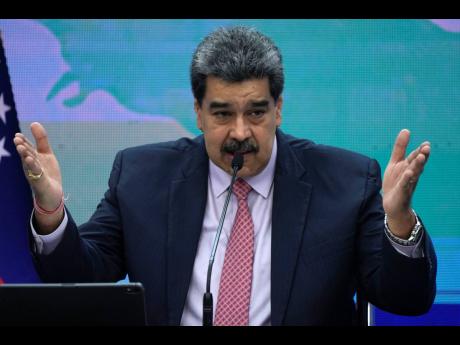Editorial | Another reason to talk to Maduro
Last week’s announcement by Trinidad and Tobago that the United States has agreed to ease its sanctions to allow Caracas and Port-of-Spain to jointly develop a natural gas field that straddles their maritime border is another signal to Jamaica to reset its relations with Venezuela.
For as this newspaper has previously pointed out, there is no reason for Jamaica to continue to sacrifice its interests for ideological and/or political causes from which the Americans are clearly moving beyond because it is to their benefit to do so.
In 2018, Trinidad and Tobago’s National Gas Company (NGC), the Venezuelan state-owned Petróleos de Venezuela, or PDVSA, and the global energy giant, Shell, unveiled their agreement to develop the Dragon field, where Caracas had previously disclosed the discovery of 4.2 trillion cubic feet of gas on its side of the border.
However, the project fell victim to economic and political sanctions imposed by the United States on Venezuela after Nicolás Maduro’s re-election of president in an election that the opposition claimed to be fraudulent.
Jamaica joined a slew of Caribbean and other hemispheric countries that sided with the United States in arguing that Mr Maduro was not Venezuela’s legitimate president, but stopped short of formally acknowledging Juan Guaidó, the then president of the National Assembly as the self-declared interim president and leader of a parallel government.
Jamaica, nonetheless, mothballed its embassy in Caracas as well as voted to seat Mr Guaidó’s man as Venezuela’s representative to the Organization of American States (OAS). At the same time, Jamaica renationalised PDVSA’s 49 per cent stake in the 350,000bpd Petrojam oil refinery after Kingston could not agree a price with Venezuela for Jamaica’s reacquisition of the asset.
ADJUST THE PRISM
However, Venezuela’s internal politics, as well as hemispheric and global developments, have been forcing the United States to adjust the prism through which it views Venezuela. It should also cause Kingston to recalibrate its relations with Caracas.
First, Mr Guaidó failed to gain real political traction at home. So Mr Maduro’s government remains firmly in place. Meanwhile, elections in Latin America and the Caribbean installed a raft of governments that did not subscribe to the notion of Mr Guaidó’s presidency.
The most significant development, though, was the Russia-Ukraine war and the sanctions, including on its oil exports, the West imposed on Moscow in response. It caused a spiral in the price of petroleum, causing the highest price Americans paid for gasolene in decades. The spike in oil price, coupled with global supply chain issues, helped to fuel inflation and the possibility of recession in Europe and the United States.
Unsurprisingly, Joe Biden’s administration is keen for a return of Venezuela’s oil and gas to the global market. It has tentatively been adjusting Washington’s policy towards Caracas.
Last November, Washington agreed to allow US oil company Chevron to resume an oil-production partnership with PDVSA. Cash from the sale of the oil that would otherwise accrue to Venezuela will go to clearing debts to Chevron.
This was followed earlier this month by the decision of the majority of the Venezuelan so-called interim government to remove Mr Guaidó as leader and dissolve the body, declaring it “no longer useful and … of no interest to citizens”. This could not have happened without the imprimatur of the United States.
Then there was last week’s announcement by Keith Rowley, the Trinidad and Tobago prime minister, that the Americans will waive third-party sanctions against his country to allow the development of the Dragon field.
TWO NOTABLE FACTORS
There are two notable factors in Dr Rowley’s announcement.
First, he paid tribute to several Caribbean Community (CARICOM) countries that were part of the diplomatic initiative that resulted in Washington’s decision. Jamaica was not named among them.
Second, while Dr Rowley said that CARICOM countries would benefit from 350 million cubic feet of gas per day that will eventually be available to Trinidad and Tobago, Jamaica’s energy minister, Daryl Vaz, embarrassingly, scrambled for information on the agreement.
“We have no formal communication,” Vaz told the Daily Observer newspaper. “I have checked with Petrojam, and they are not aware. Right now we are trying to follow it to see what we can (gain) ... out of Trinidad.”
The obvious conclusion is that Jamaica, which used to be seen as CARICOM’s natural political leader, was out of the loop. The region’s political axis has shifted to Mia Mottley’s Barbados.
It is important that Jamaica begin to put things right, starting with its relations with the United States.
It ought to be clear, if that was the concern, that there is no penalty to be faced from Biden’s America for re-engaging Caracas. That is precisely what Washington is doing, even if in increments.
Jamaica used to be a beneficiary of Venezuela’s preferential PetroCaribe until the arrangement collapsed under the weight of the American sanctions and the country’s internal problems. Jamaica should want to be at the head of the line in an effort to diversify its energy sources should Venezuelan oil and gas return. Moreover, Venezuela’s economic recovery, if that happens, could also mean a market for Jamaican goods and services.
There is also value in a country’s ability to influence events.

